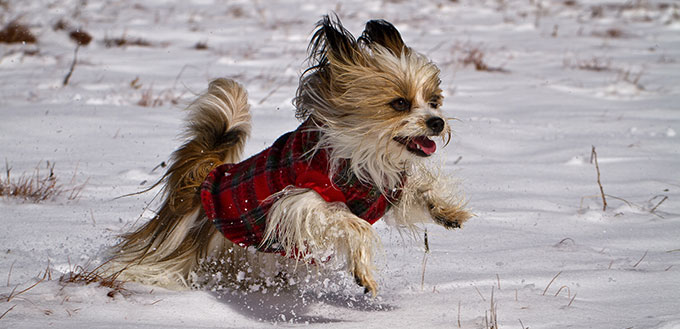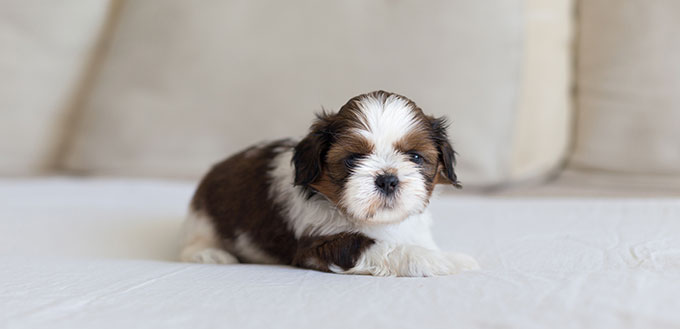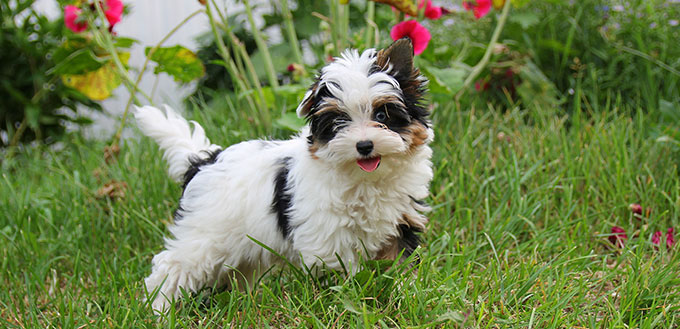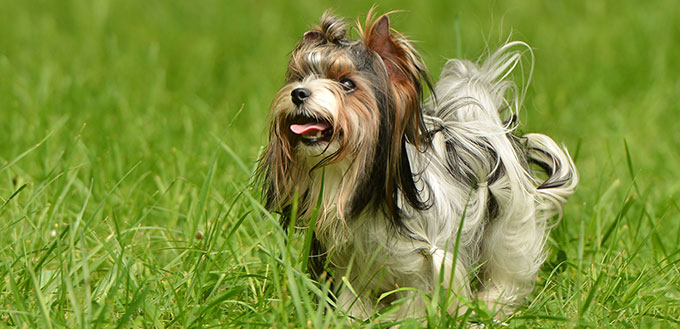The Mi-Ki (pronounced Mee-Kee) dog is a relatively new toy breed that encompasses the best qualities of several old toy breeds hailing from Asia and Europe. This is a friendly, intelligent, sweet-natured, and playful pooch that is often used as a therapy dog. Above all though, the Mi-Ki dog is adorable – truly one of the most beautiful, sweetest and gentlest toy breeds in the world, who make for wonderful family pets and emotional support pups. While the MiKi dog is a result of several different breeds, there are a number of theories on the origins of this toy breed, all of which we’ll explore in detail in this article. We’ll also talk about other important things you should know about the Mi-Ki dog, including its temperament, health, grooming needs and more, so if you’re thinking about getting this charming little pup, be sure to read everything!
History of the Mi-Ki Dog
The history of the Mi-Ki dog is not as clear as we’d like it to be. The fact that this gorgeous little pup seems to have multiple different, although similar-sounding names, including Meeky, Mickey and Meekie dog, doesn’t help the situation. The confusion stems from the unusual spelling of the dog’s name – after all, Mi-Ki does sound like it could be spelled in various ways. But why does this matter? Let’s find out.
As mentioned, the origin of the Mi-Ki dog is unclear. Some theories claim that this is an American-made purebred dog, while others argue that the Mi-Ki is more of a crossbred dog. What’s even more confusing is that there are several different clubs with their own standards for the breed, each one slightly different from the other. What remains the same across all clubs though? The name. This is important for multiple reasons, the main one being the founder of the breed – Maureen Westburg, also known as Micki Mackin, Westburg Mackin and Maureen Mackin Westburg. Regardless of the club and origin theory, Maureen has remained the one constant in the history of the Mi-Ki, which explains why the breed goes by so many differently spelled names – they all sound like Micki (Maureen), the founder.
According to the American Mi-Ki Club, it took Maureen 30 years to create the Mi-Ki dog as we know it today. In 1959, she acquired two Shih Tzus. Incidentally, the breed was recognized by the Federation Cynologique Internationale just two years before (it will be another decade before full recognition by the American Kennel Club). These two Shih Tzus were blue and white male called Playhouse Kalis, and a chocolate and white female called Marjack Bambi. Maureen kept a girl from Bambi’s litter, breeding her and future offspring not only to other Shih Tzus, but also various other breeds, including Tibetan Spaniel, Papillon, Japanese Chin, Maltese, and Yorkshire Terrier. All of these breeds were included in various combinations in Maureen’s early breedings as she wanted to incorporate various positive qualities into the new offspring.
Easy to follow, right? Well, at least up to here. Maureen continued breeding her pups with various other breeds in efforts to create the perfect toy breed dog. About 30 dogs -plus their offspring – interbred for years, until finally, in 1989, a female dog named Tee-Nee In-Chan-Ting was born. This dog was a cross with a Shih Tzu and a Maltese/Tibetan Spaniel/Papillon mix. In 1990, a male Tee-Nee In-Chan-Ting was developed from a cross between Shih Tzu and a Maltese/Shih Tzu/Japanese chin mix. Maureen considered this pair to be the finished version of the Mi-Ki dog, named after her childhood nickname, “Mikki”.
One year later, in 1991, Maureen established the Imperial Toy Mi-Ki Club and created a breed standard. To highlight the American origin of the Mi-Ki, this club’s name was changed into the Greater American Mi-Ki Club in 1993.
So, why is the history of the Mi-Ki breed so unclear? Firstly, it should be noted that Maureen didn’t keep written records of her early mixed breedings. In other words, those breeds involved in the creation of the MiKi dog we described above? They are a result of Maureen’s memory. So, naturally, there were differences of opinion on breed development among later dog breeders. This led to differences of opinions on club politics as well, which culminated in the formation of new clubs and registries, which, as we mentioned at the beginning of this chapter, all had slightly different standards for the breed.
So, what is a Miki dog? The answer to this question would probably slightly vary from club to club, but it’s safe to say that no matter the breeder and their opinion, the Mi-Ki dog is Asian in origin, but bred in America. The breed shares a common ancestry with the Shh Tzu, Maltese, Japanese Chin, Yorkshire Terrier and Papillon, however, the exact percentages of each breed in the genetic makeup of the Mi-Ki are not known. Nevertheless, the MiKi is considered to be a purebred dog.
Quick Facts
Happy, loving and gentle, Mi-Ki dogs make great canine companions for toy breed lovers averse to excess barking. These adorable pups love not only humans but other animals too, including other dogs and cats; in fact, they’re known to exhibit some feline behaviors themselves! But while they are the definition of the adorable, Mi-Ki dogs are not for everyone. Here are some quick facts about the breed which can help you decide if the Meeky dog is the right fit for you and your family.
- The Mi-Ki is a purebred toy breed, specifically bred for calm companionship and friendly, engaging personality. The average full grown MiKi dog weighs between 4 to 10 pounds.
- MiKi dogs enjoy great health, however, like all breeds, they’re not immune to certain diseases and health problems. In particular, MiKis have a predisposition for luxating patella, but that is true for most toy breed dogs.
- The breed comes in two coat varieties: long and smooth. The former variety boasts a silky, straight coat with a fine texture, as well as long feathering on the ears. The latter variety features a short coat that lies close to the body and short fringing on the ears, but no beard or mustache. Regardless of the coat type, the Mi-Ki dog comes in various colors and patterns, including cream, white, gold, brown, black, red and other. They can be bi-colored, tri-colored and solid (rare).
- MiKi dogs are sociable, calm, intelligent and easy to train. This makes them great service and therapy dogs, as well as companion pets for families with children.
- They are generally well-behaved and quiet as they don’t bark much (if ever); instead, they yodel from time to time!
- Mi-Ki dogs are known to exhibit certain feline behaviors. For instance, they can be taught to use litter box easily, they’re quiet and even-tempered yet very playful, and most are very comfortable and friendly with other pets, including cats. In fact, some female Mi-Ki dogs have been witnessed to be taking care of kittens as if they’re their mothers!
- Because this is a fairly new breed with hazy origins, it’s not yet recognized in most official dog groups, including the American Kennel Club. They are, however, recognized in the International All Breed Canine Association and International Canine Kennel Club.
- This is a rare breed, and as such, can be a quite expensive dog. MiKi dog price varies anywhere from $3,600 to $6,500, depending on the breed line and pedigree. That said, the average cost is about $1,600.
Things You Should Know
The “Mickey” dog breed is an adorable, charming and smart little pup who makes for an excellent companion, both for families with children and other pets and those without. But, like any other breed, this is not a dog for everyone. MiKis don’t do well with being left alone for long periods of time are known to suffer from separation anxiety. This makes them unsuitable for people working long hours every day, as well as folks who travel often. Still, this is a wonderful toy breed dog that with the right care and love can develop into a wonderful lifelong companion. If you’re considering getting a Mi-Ki pup for yourself, here are some important things to know about the breed.
Training
MiKi dogs are intelligent, clever little animals who are very easy to train. They respond best to training techniques that use positive reinforcement methods, and not well at all to harsh techniques. After all, this is a sweet-natured, gentle dog that thrives on praise and encouragement first and foremost. Because they’re loving and eager to please, training them is easy even if you’re a first-time dog owner. That being said, like all toy-breed dogs, MiKis are prone to developing “small dog syndrome”, so early and consistent training and obedience classes are a must. Otherwise, they can grow into fussy, yappy fur-nightmares. It’s best to start training your Mi-Ki early, when they turn three months.
Feeding
MiKi dogs don’t have special diet requirements. They should do well on high-quality commercial dog food that is complete and balanced, but can also eat healthy homemade meals here and there. If you want the absolute best in terms of nutrition for your pup, we recommend buying foods specially formulated for small and toy breed dogs. Overall though, MiKis are not demanding when it comes to nutrition, so you shouldn’t have a hard time finding the best diet for your pet. With that said, it’s best to stay away from cheap brands that use a lot of fillers and additives in their recipes. Mi-Ki dogs should ideally eat natural, quality foods that contain real meat as their primary ingredient, followed by healthy fat and some wholesome, fibrous carbohydrates.
Grooming
The Mi-Ki dog’s grooming requirements are not particularly high because they don’t shed very much. And as a huge bonus for sensitive folks who struggle with allergies, it’s good to know that the MiKi’s coat is hypoallergenic.
So, how much brushing and bathing do Mi-Ki dogs need? This depends on the type of coat they have – the long coat variety naturally needs more brushing, while the smooth coat variety dogs require less. Generally, the long coat MiKis should be brushed two to three times a week maximum, while the smooth MiKis need a weekly overall brushing. When brushing your dog’s coat, don’t forget to check and clean their ears, gums and teeth. Some MiKis have sensitive gums and/or teeth, and will need consistent proper dental care (daily gentle brushing and dental treats). To keep your pooch nice and clean, consider bathing them once a while (every three to six months), using gentle dog shampoos.
For more help on dog grooming, you may wish to read our guides on the best dog dryers, dog clippers and grinders, tear stain remover for dogs, and dog paw washers.
Health
For a purebred dog, the Mi-Ki dog is incredibly healthy. Not prone to any significant health problems, this breed is easy to keep in top shape with a good diet, regular exercise and vet checkups.
That being said, the Mi-Ki is a toy breed, and like any other small breed dog, it is prone to patella luxation, also referred to as kneecap dislocation. This condition can cause problems like cartilage damage, pain and inflammation. The cause of luxating patellas? Genetics and trauma. In most cases, dogs diagnosed with patellar luxation were born with it, while a small number will develop it as a result of some kind of physical trauma. For this and other reasons, it’s important to maintain regular vet appointments to ensure any potential health issues are spotted, diagnosed and treated early.
Temperament
Mi-Ki dogs are sweet, gentle and friendly pets who get along well with both people and animals. They are generally well-behaved and well-mannered even with little training, making them ideal pets for first-time dog owners. Interestingly, Mi-Ki dogs rarely bark, so they’re pretty quiet overall. However, they do produce funny, cat-like sounds when they talk to you.
For such a tiny dog, the Mi-Ki is full of energy, playful and engaging – this is a dog that likes nothing better than spending time with their human family (and ideally, the time will be spent playing together). Being social and happy, they love the companionship of almost everyone, including children and other animals, even strangers! While this makes them adorable and charming, it also means they’re lousy watchdogs, so keep that mind if you’re considering getting a Mi-Ki pup.











